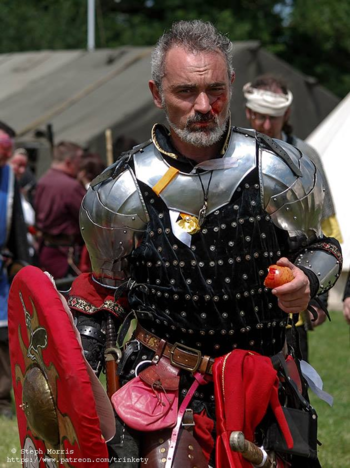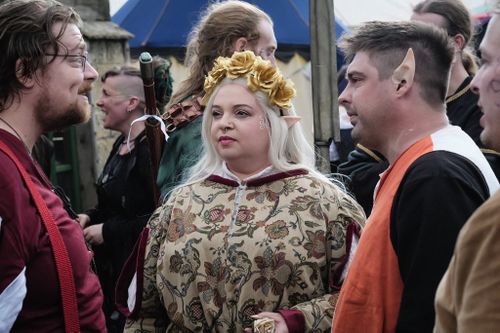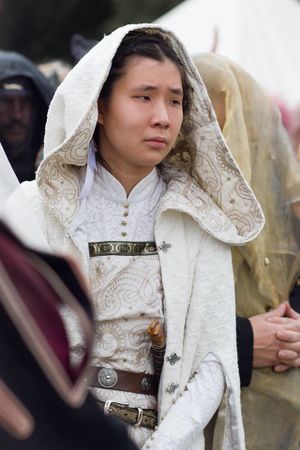Dawn monarchy update
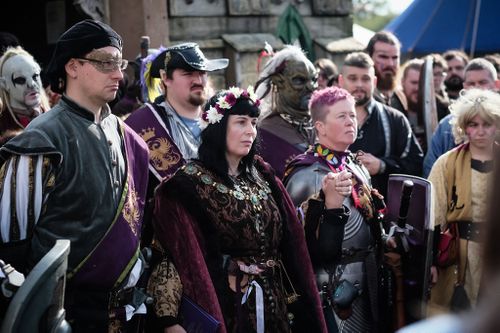
Overview
We've had a number of emails with questions regarding the traditions of the Dawn monarchy, the mechanisms for interacting with those traditions and what the consequences might be. Rather than answer those emails individually, we've done a single wiki page to try and cover all the details relevant to this.
Most of what is outlined on this page represents the cultural traditions and assumptions of the rank and file Dawnish NPCs - the people who do not normally attend the summits at Anvil. In effect an extension of the Dawn brief as it applies to the hundreds of thousands of citizens who live in Dawn. Although we expect Dawnish players to follow the overall tenor of the Dawnish brief when creating their character, they are not bound by specific elements on the brief - but equally the brief is not affected by individual or collective departures from it.
Cultural not Legal
The monarch of Dawn is primarily a cultural tradition. The title doesn't have any legal powers and as such, the election of the title is not directly governed by Imperial law. Imperial law is the only law valid in the Empire - so that means that the title does not fall within any legal jurisdiction. When Dawn was an independent sovereign nation then the monarchy would be bound and governed by Dawnish laws - but those laws ceased to be binding when Dawn joined the Empire. An individual might argue that the original Dawnish law represents the most authoritative source for ruling what is appropriate, but few records of that era remain and it would need significant research to recover them if that were even possible.
Instead the rules governing the Dawn monarch are primarily traditional - a reflection of the longstanding Pride that the Dawnish people feel in their monarch and the importance they attach to the position. It is possible to change these traditions - they have been changed before on a number of important occasions - but doing so takes considerable effort if people are to be convinced of the legitimacy of the changes.
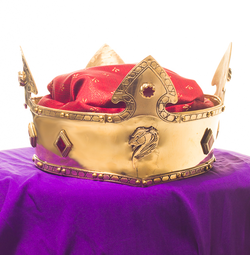
Sovereignty
Since the foundation of the Empire, there has never been a Dawnish monarch who wasn't also the reigning Throne. According to the Dawnish history, the nation joined the nascent Empire at the point where the First Empress became the Queen of Dawn. Such membership was more de facto than legal however, with the tourney to elect the First Empress serving as a rallying ground for noble houses on either side of the argument. However arguable just as significant was the decision not to elect a monarch after the death of the First Empress. Had the Dawnish nobility not taken that decision, the course of history might be very different.
By general acclaim the monarch is the head of state for the Dawnish nation. There is no legal standing for such an arrangement - Imperial law is very clear that the Throne is the head of the Imperial state. But the existence of a separate head of state for Dawn does not cause any legal or constitutional conflicts, provided the title is combined with the Throne.
The Throne shall lead the Empire and represent her in all things.
Imperial ConstitutionIf that were not the case - if the nobility of Dawn chose to elect a monarch who was not The Throne - it would have wide-ranging implications for Dawnish membership of the Empire. It would bring into question the Loyalty of every Dawnish citizen - do they consider The Throne to be the ruler of Dawn or the monarch? The only clear constitutional way that Dawn can have both a monarch and an emperor is if they are the same person, otherwise they would have to choose between one or the other.
Over the centuries since the Empire was formed there have been a few moments when Dawn has contemplated the restoration of an independent ruling monarchy. The most notable incident took place in 137YE during the reign of Empress Varkula. Dawnish unhappiness with the political outcome of the Holberg campaign was widespread and a dozen prominent Dawnish nobles were discovered to be gathering support for a plan to make Marthe of House Edwillion, Queen of Dawn. Marthe was a great bull-necked woman, widely considered the most successful general from the Holberg campaign and beloved in Dawn as much for her awesome fighting demeanour on the tourney field as her military genius.
Had they taken any action, the plotters would have faced charges of subverting the agencies of state, but the Empress was disinclined to leave the matter to the magistrates. Instead she made a public address in the Senate spelling out in no uncertain terms the unique role of The Throne as the head of the Empire. In her inimitable acerbic style she explicitly threatened Dawn, but made it clear that she would use the full powers of The Throne against any nation that sought to divide and undermine the Empire in this way. At the very least, she would ensure that such a nation immediately lost all military support, and would be left to face the barbarians alone. There are no records of what follows, so it appears that Varkula's threat appears to have been sufficient to cow the rebellious nobles.
There are some clear alternatives that would avert the crisis of having two heads of state. One is the route taken by Wintermark, when they joined the Empire. The Mark retains the traditional regalia of their monarch, the Crown of Three Tears, but when they joined the Empire the last King gave the crown to the Kallavesi mystics and they granted it the champion best able to inspire the nation. There would be considerable resistance to such an approach in Dawn - the monarchical tradition is seen by many as the natural corollary to the nobility of the houses. But it might be possible to persuade people to rename and re-purpose the title to something that held less status - for Dawn to cease to be a monarchy.
The obvious alternative route involves a very different change. The constitutional conflict presented by having two different heads of state would also be avoided if Dawn chose to leave the Empire. If Dawn were once again a sovereign nation, then they would be free to chose their own law and could elect a ruling monarch. Disgruntled nations have contemplated independence from the Empire before - but have usually been put off by the potential costs. Few nations are confident of being able to face the barbarians alone. Just losing access to the power of the Sentinel gate alone could damage their military capabilities - assuming that such a nation still found it worthwhile to continue to meet with the other nations at Anvil.
Nationality
Since the foundation of the Empire there has only been one monarch of Dawn who was actually born Dawnish. Empress Richilde, called the Sun Queen, best exemplified the glorious tradition and spirit of the Dawnish people. The tourney to elect her Queen was appropriately glorious but the outcome was never in any doubt. The only other Dawnish Throne, Emperor Hugh, was urged by some Dawnish nobles to seek the title but he refused for reasons of his own.
Many Dawnish folk claim the First Empress as one of their own however. Before the foundation of the Empire there were no egregores - and hence no definitive test of nationality as there is now - so there is some basis for acclaiming her as Dawnish. While she was clearly Highborn by birth - when she arrived in Dawn she came arrayed as a knight-errant carrying the Sun banner. She was clearly well-versed in Dawnish traditions and followed them easily. She was extensively tested by the nobility of the time, joined House De Cervise as a noble of their house, and chose to set a Test of Ardour for King Rodric when he swore his love for her. By the standards of modern times most scholars accept that such acts would likely be sufficient for the individual to become Dawnish - if they so chose.
However when Dawn opted to become part of the Empire - and to subsume the monarch to the Imperial Throne - they accepted the reign of numerous monarchs that were not Dawnish. This essential contradiction is resolved for most Dawnish people by the fact that while they don't require their monarch to be Dawnish, they do require them to be glorious. Glory is far from the only criteria that defines the Dawnish spirit - but their elevation of that criteria above all others is arguably the most significant. Thus, in the minds of the more Imperial-minded Dawnish citizens, the glorious nature of their monarch is more important the candidate's nationality.
Not all occupants of The Throne have been truly glorious - but Nicovar's lack of glory was likely the key reason that saw him defeated on the tourney field. In contrast Emperor Guntherm achieved a resounding victory on the field. Ever-after he expressed a great pride in the title of King of Dawn and was considered to be a close friend of the nation. Some claim his decision to sign a peace treaty with the Jotun and turn his attention on the Druj (rather than the other way round as many Winterfolk might have preferred) reflected his close relationship with Dawn. But no matter how glorious he might have been - or how proud he was of the title - nobody would ever have been confused about his nationality... Guntherm was a quintessential warrior of the Mark and it showed in everything he did.
The current Imperatrix is every bit the League citizen no less than Guntherm was a Wintermark warrior. She was accepted by the Dawnish nobility on the tourney field but she is no more Dawnish than Marcher poppets or Highborn veils. No matter what tests she took, there is no possibility of any kind that the Dawnish egregore would accept her into the nation while she so perfectly embodies the very spirit of the League. The right test can reveal whether or not someone is glorious - but that is far from sufficient to make them Dawnish.
Nobility
In Dawnish society, a noble is any Dawnish citizen who has successfully completed a Test of Mettle and thereby been recognized as a member of a noble house. Nobility confers certain legal rights - most significantly the right to confer their favour to elect a senator - but it also brings significant prestige in Dawn where it is widely regarded as the first step on the path to a glorious life. Inherent in the very nature of a Test of Mettle is the fundamental idea that the citizen who takes it is Dawnish - and will join the house as a member of their nobility if they are successful. Anyone might set a test for someone - but if they are not the earl of a noble house setting the test for a Dawnish citizen seeking to become a member of their house then by definition the test is not a Test of Mettle.
Testing people to see their worth is a profoundly Dawnish tradition. The Imperial Test of Citizenship and Test of Arms both derive from Dawnish traditions of testing young citizens to see if they are ready to pursue a path to glory. Key points in Dawnish life are punctuated by tests - the Tests of Mettle, Ardour, and Resolve are the best known of these. Testing someone is far more than just a mechanism to demonstrate whether or not a candidate is worthy - by its very nature a challenging test encourages the errant yeofolk to glorious ends in pursuit of triumph. A good test stretches the one who attempts it, driving them to achieve more, pushing them to attain glory and granting them an opportunity to demonstrate it. And a great test can also bring glory to the house that sets it.
How Dawnish nobles regard citizens of other nations tends to vary from house to house. A few noble houses maintain that Dawnish nobility is the pinnacle of Imperial civilisation, beyond the reach of members of other nations. However most nobles are prepared to accept that a citizen of another nation is capable of pursuing and achieving glory and there are many and varied circumstances where a Dawnish earl or noble might deem it appropriate to set a test for such a citizen. They might wish the citizen to prove themselves for some reason - or they may use a test to encourage them - helping them to achieve glory. In rare cases passing such a test might be the precondition a house sets to treat another Imperial as their social equal - such a thing would be the nearest equivalent to a Test of Mettle that a house might set for a member of another nation.
Passing such a test doesn't make you Dawnish, and by definition it doesn't make you a Dawnish noble. You can't be part of a Dawnish noble house if you're not Dawnish and you can't be a Dawnish noble if you're not a member of a noble house. Taking such a test may prove your worth, it may be a precondition for aid, support, or merely respect - testing can be used for many things. But in the eyes of Dawnish folk, the tradition of glorious Dawnish nobility is reserved for those who chose to be Dawnish.
Suitability
The primary demand that the Dawnish people have for their monarch is that the individual should be glorious. When the Dawnish armies march they want to do so in the knowledge that the serve a glorious King or Queen. The Senate may at times provide effective government to the Empire, but even its most staunch supporters are unlikely to describe the horse-trading of votes that regularly takes place there as glorious. The Throne is a more inspiring symbol by far - partly by design - but the occupant is chosen by the Senate and may struggle to be more glorious than the house that raised them up. But nobody can become monarch of Dawn without the approval of the Dawnish nobility - as such the position holds a unique role in Dawnish hearts - a figure that can reflect the glory they all aspire to.
To ensure that the monarch is worthy of the title - worthy of the love of the Dawnish people, they are first judged by the nobles. The selection of the Dawnish monarch stretches back to the earliest histories when the first King's heir - Circe the Swan ordained that rather than inherit the title, the new monarch would be chosen by tourney. Arwaine the Bold won the first tourney setting in place a tradition that has stood for centuries. After Dawn joined the Empire, the tradition was adapted with the understanding that only The Throne might stand in the tourney, but that any noble could take the field against them if they felt them to be unworthy of the honour. In effect the tourney to elect the monarch became a test for the new throne, judged by the nobility of Dawn to see if they were worthy to bear the title.
The people of Dawn expect the nobility of Dawn who attend Anvil to take this weighty responsibility seriously. The overwhelming view of the Dawnish people is that the decision cannot be changed; the expectation is that the monarch will serve for life. There is no historical precedent for the decision to elect The Throne to be reversed. This is in keeping with other Dawnish tests - an earl cannot change their mind and decide a noble has in fact failed their Test of Mettle. If a noble has passed a Test of Ardour and married someone - there are no grounds to annul the marriage because the test was in error. The nobility of Dawn are required to judge the suitability of The Throne to become monarch of Dawn and take a side accordingly - if their support is conditional - then the expectation is that such matters are decided before the tourney is complete and the monarch is chosen - not after.
Only one monarch, Empress Brannan, has ever come close to being removed. According to some accounts the Empress was somewhat reluctant to stake a claim the title but was eventually persuaded to do so. Despite this initial reticence she was surprisingly popular among the Dawnish many of whom admired her to the end. Brannan may have failed in her attempts to expand the Empire's borders but she held nothing back from the attempt. When she was revoked by the Imperial Synod a crisis loomed, as many Dawnish nobles refused to acknowledge the right of the Imperial Synod to remove their monarch. Some sought a way for her to abdicate, but a few were intent on her remaining as the reigning monarch. These questions were never fully resolved as the Empress died on the first night of the following summit.
Although there is no historical precedent for it, it is difficult to see how the Dawnish nobility could have refused to accept Empress Brannan's decision had she chosen to abdicate. Imperial citizens may step down from any Imperial position simply by informing an appropriate magistrate or civil servant that they have done so. As mentioned though, the monarch of Dawn is not an Imperial title, so it does not automatically follow that the position can be abdicated. Any attempt to do so by a sitting Throne might well prove contentious; depending on the circumstances that provoked it, such a step might be seen as a rejection by Dawnish citizens.
There is no predefined way for the monarch to abdicate - any suitable mechanism would be expected to involve a formal announcement at a formal meeting. For example, a formal address to the Earl's Council, an address to the Senate or an an address to the Empire could all be used by a reigning monarch to announce their abdication. The advantages of a formal mechanism of this kind, particularly the latter two, is that if done properly it removes any possible doubt over whether a monarch has abdicated or not. As recent events show, a heated argument on the steps of the Senate demonstrably does not provide the same clarity; precisely why most constitutional and legal scholars would regard it as utterly inadequate for the purpose of delivering a formal notification of abdication.
As the rules governing the monarchy are traditional rather than legal, troubadours and priests might make attempt to sway sentiment in favour of a change in those traditions by passing an appropriate statement of principle or mandate in the Dawnish Assembly. Such an attempt would not be easy or without cost. The monarch of Dawn has reigned for life for longer than the Empire has existed - changing those expectations would be challenging. It would also involve inevitable compromises that diminished the respect and prestige accorded to the position in the hearts of many. It challenges the essential nature of a monarch if the position must be reaffirmed yearly. There is a fundamental difference between a monarch that is elected and rules for life and one that serves only at the whim of the Earl's Council.
Forcibly removing the monarch, deposing them, would also be challenging. At least one Dawnish monarch, Penni the White, was assassinated. Such an act remains a possibility - though obviously it would not be legal under Imperial law. In pre-Imperial times it might theoretically have been possible for an earl to raise sufficient support to rebel or over-throw an unpopular monarch. There are no records of such a thing - but that doesn't mean it didn't happen. But again it seems difficult to envisage how anyone might attempt that and stay within the bounds of Imperial law. Any successful attempt to forcibly depose the monarch would diminish the title in the same way as changing the tenure of the role, depending on the degree of popular support for such an action.
The Dawnish National Assembly recognises the Empress Lisabetta as Queen of Dawn. She is the ultimate authority in this life and her words should be followed above all others
Dawn National Assembly, Tamain Sepulchre, 381YE, Greater Majority, 158 - 20The Dawnish Assembly
Much of the assumptions about the position of the monarch of Dawn are a consequence of centuries of tradition that have built up since Dawn was founded - and then adapted at the point where Dawn joined the Empire. Traditions are important in the Empire, adherence to them is regarded as a virtuous act of Pride, so most people do not surrender them lightly. The Dawnish are not pig-headed though - they will adapt their traditions where there is a clear need to do so - if they are given effective leadership.
The Synod and even more importantly, the Dawnish Assembly, are the primary source of such leadership. The Dawnish characters who attend Anvil for the summits do not control the views of the Dawnish people - but they can directly influence them via the judgements passed by their Assembly. An appropriately worded statement of principle can begin this process, especially one passed with a greater majority. If it creates an opportunity for a mandate, then that may bring about significant lasting change if it is passed and spread across the nation.
There are crucial limitations on what any assembly can achieve however. The Highborn Assembly is never going to convince the Highborn people that they should stop bothering to wash no matter how many votes such a statement of principle attracts. A greater majority in favour would not convince people of the virtue of a lack of cleanliness; rather any judgement that ran counter to the central traditions of a nation would simply convince people that their assembly had taken leave of its senses.
Even if the Assembly does successfully influence the prevailing mood - it cannot dictate what the outcome of such a change will be. A statement of principle calling for Dawn to have their own independent monarch drawn from the Dawnish nobility might succeed, but it is exceptionally difficult to do so without creating support for the idea of an independent Dawn. A statement seeking to change the tenure of the monarch of Dawn would only succeed if it changed views on the nature and status of the title.
It is not possible to be certain in advance what the impact of a statement of principle will be. Any statement may influence the way people think and feel about a subject - the greater the majority the more emphatic any influence is likely to be. However the impact will always be limited to the way people view the issue - creating change that produces direct game effects requires a mandate. These may come in response to a statement passed by the assembly or they may arise spontaneously reflecting the moods of the people. With any mandate we will always try to make transparently clear what the outcome of passing that mandate would be - so player-characters know the effects before they decide whether or not to support it.
It is important to be aware that it is difficult and expensive for the Synod to change their mind. NPCs in the Empire setting experience a powerful primacy effect. If a greater majority of the Dawnish Assembly pass a statement of principle lauding the Imperatrix as the rightful Queen of Dawn then that has a significant lasting effect on how people view the Imperatrix in Dawn. If they later pass a judgement saying that Empress Lisabetta is insufficiently glorious then that is less effective than it would otherwise have been. This directly flows from core game design elements that decisions are expensive and difficult to reverse. The Assembly can't explain that new facts have come to light and claim that they were all wrong the first time, without undermining confidence in their ability to make wise judgements.
Yael
In Winter 380YE, the Dawnish Assembly passed a statement of principle drawing the attention of all Dawnish citizens to the claims by Yael of Highguard that she was the First Empress reborn. Because of the unique position of the First Empress in Imperial history, and especially in Dawnish history, this led to an unusual situation where people questioned whether Yael's claim to the Throne of Dawn was not the equal - if not superior to that of the Imperatrix.
There is no traditional or constitutional support for this idea; the tradition is that the current Throne is entitled to stake a claim to the position of monarch of Dawn. Citizens who have had past life visions of being an emperor or empress are not unknown - but none ever merited such an offer. But in the four hundred years since the Empire was founded no-one else has ever reported a true liao vision of being the First Empress. Yael's claims were more significant because of their magnitude - not just that she was the First Empress reborn - but that she was a paragon returned from the beyond the Labyrinth.
The Troubadours of Dawn hold up the following song as proclamation:
Some folk must walk the Labyrinth. To atone for their wrongs.
Four thousand winters: Think it not too long.
But others through the Labyrinth pass. To a land without tears.
As true liao scholarship. Discovered through the years.
Dawn's first Empress returned to us. From that happy vale.
Reincarnate in the person of Highborn Yael.
Blessed be this paragon. Returned from beyond.
Raise your voices. And praise her in Song.
Had the Dawnish nobility opted to recognize Yael's right and declared her Queen of Dawn on the tourney field, then it would have created a constitutional conflict between The Throne and the monarch. We should have called this out in the text of the original wind of fortune that followed the Synod judgement. We failed to do so because we didn't adequately map out the consequences of such an action so we didn't notice at the time. As part of the Empire, Dawn cannot have two different heads of state to whom people give their Loyalty. The consequences of such an action - and the different ways it might have been resolved are no longer relevant since Dawn took a different route.
The potential for Yael to be proclaimed the monarch of Dawn shows clearly that such a thing is possible - but to have any credibility with the Dawnish people the candidate would have to recognized by the Dawnish Assembly as truly extraordinary. The Imperatrix had the right by dint of being the single person selected by the Empire from the millions of living citizens to sit on the Throne. Yael's entitlement was based on her claim to be not just a living paragon, but the greatest human being that ever lived reborn, the individual whose glorious deeds brought Dawn into the Empire and created the modern monarchy. Yael demonstrates that any citizen whose deeds were similarly glorious might be recognized to have a similar entitlement - but that shouldn't be confused with the idea that the Dawnish people will accept anyone as their king or queen, nor does it remove the dramatic consequences such a decision might have.

